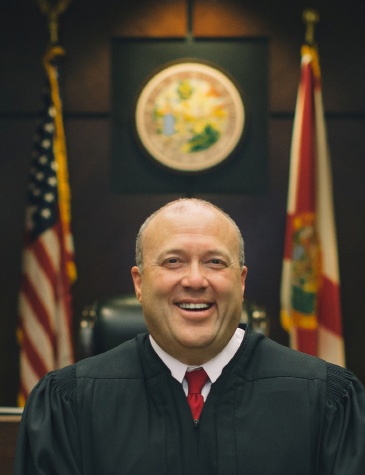
Ask Judge Smith
Try civics and sausage for breakfast

By Judge Layne Smith
Special to the Outlook
On Saturday mornings I enjoy having breakfast with my parents. Last week, Mom asked me to explain state government. After my first cup of coffee had kicked in, this is what I told her.
There are three independent and equal branches of state government —the legislature, the executive, and the judicial. Florida is governed by a constitution which lists the powers and responsibilities of each branch.
The Florida Legislature passes laws and the state’s budget each year. This is the branch that develops the state’s public policy, which is enacted when the Governor (in the executive branch) signs bills into law. The executive branch also enforces the law through the Governor and three independently elected Cabinet officers: the Attorney General; the Commissioner of Agriculture; and the Chief Financial Officer.
The third branch is the judicial branch or court system. People appreciate a judiciary that consistently and efficiently applies the rule of law. It’s like having a good umpire that calls a fair and consistent strike zone each game—you know what you are going to get, no matter which team is at bat.
As part of the judicial branch, judges interpret and apply the law and resolve criminal, civil, and family law cases. The judiciary’s priorities include ensuring due process, equal justice, and fair, impartial, and transparent proceedings. Hearings and trials are open to the public, and a record is made of every criminal proceeding. Cameras and television coverage are common in courtrooms. Courts cannot function without the people’s trust.
County and circuit courts are courts of original jurisdiction, which means each case is tried before a single judge, one at a time. The 67 county courts handle the largest volume of cases, largely consisting of misdemeanor charges, small claims up to $5,000 and civil cases involving between $5,000 and $15,000. Circuit courts handle the more complex cases–felony charges, civil cases involving more than $15,000, juvenile cases, probate cases, family law cases and injunctions. Circuit judges also hear appeals of county court decisions.
The five District Courts of Appeal hear appeals of circuit court decisions and final state agency actions. The Florida Supreme Court hears appeals from the District Courts of Appeal, and reviews all final orders imposing the death sentence and bond validations. The Supreme Court approves the standard jury instructions and rules of procedure used by trial courts. It also disciplines wayward attorneys and judges.
We inherited many legal precedents from English courts, collectively known as the “common law,” and Florida courts routinely issue written orders and opinions known “case law.” Imagine if you will that Florida law is shaped like a pyramid. The state’s constitution occupies the top tier. If there is any conflict between the constitution and a statute, or case law, or an executive order, the constitution wins. Florida statutes occupy the middle tier. If there is any conflict between a statute and case law or an executive order, the statute wins. Case law, executive orders and state agency rules occupy the bottom tier of the pyramid.
The civics lesson ended when the food arrived.
Remember to submit your questions about civics or law to askjudgesmith@gmail.com and we will talk again in two weeks.
This article was first published in the Tallahassee Democrat.
J. Layne Smith is a Leon County Judge who handles a wide variety of criminal and civil cases. He often speaks and writes about civics, the law, our legal system and the administration of justice.







